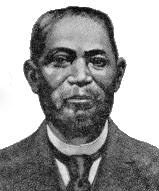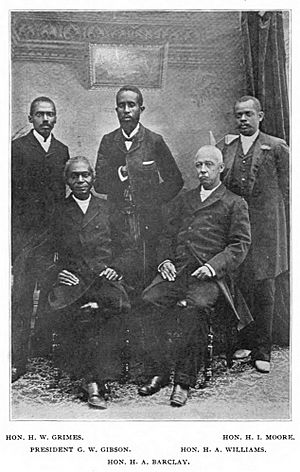Garretson W. Gibson facts for kids
Quick facts for kids
Garretson W. Gibson
|
|
|---|---|
 |
|
| 14th President of Liberia | |
| In office December 11, 1900 – January 4, 1904 |
|
| Vice President | Joseph D. Summerville |
| Preceded by | William D. Coleman |
| Succeeded by | Arthur Barclay |
| Personal details | |
| Born | May 20, 1832 Baltimore, Maryland, United States |
| Died | April 26, 1910 (aged 77) Monrovia, Liberia |
| Political party | True Whig |
Garretson Warner Gibson (born May 20, 1832 – died April 26, 1910) was an important leader in Liberia. He served as the 14th President of Liberia from 1900 to 1904.
Gibson was born in Baltimore, Maryland, in the United States. When he was 13 years old, in 1845, his family moved to Liberia. He went to school there at mission schools. Later, he returned to Maryland to study to become a religious leader.
After becoming a priest, he led the Episcopal Trinity Church in Monrovia, Liberia's capital city. He also worked for the government as the Chaplain for the Liberian Senate. Later, he helped manage Liberia College and even became its president for a time.
Gibson started his political career as a justice of the peace, which is a local judge. In 1896, when William D. Coleman became president, Gibson was chosen to be the Secretary of the Interior. This role meant he helped manage the country's internal affairs.
When President Coleman resigned in 1900, Gibson was the Secretary of State. Since there was no vice-president, Gibson was chosen to take over as president. He then won his own election later that year and served until 1904. Garretson W. Gibson passed away in Monrovia on April 26, 1910. He was the last Liberian president who had been born in the United States.
Garretson Gibson's Presidency (1900–1904)
Before becoming president, Garretson Gibson had a lot of experience in government. He had worked as the Secretary of the Interior and the Secretary of State. These roles prepared him for leading the country.
Challenges During His Time as President
During Gibson's presidency, Liberia faced challenges with its borders. In 1903, the British government made Liberia give up some land to Sierra Leone. This caused a lot of tension along that border.
Both the British and French governments often tried to take more land from Liberia. They wanted to expand their own nearby territories. However, when American warships sometimes appeared near Liberia, it helped to stop these attempts. Even though the United States didn't always offer strong support, these visits helped protect Liberia's land.
See also
 In Spanish: Garretson W. Gibson para niños
In Spanish: Garretson W. Gibson para niños
 | Calvin Brent |
 | Walter T. Bailey |
 | Martha Cassell Thompson |
 | Alberta Jeannette Cassell |


